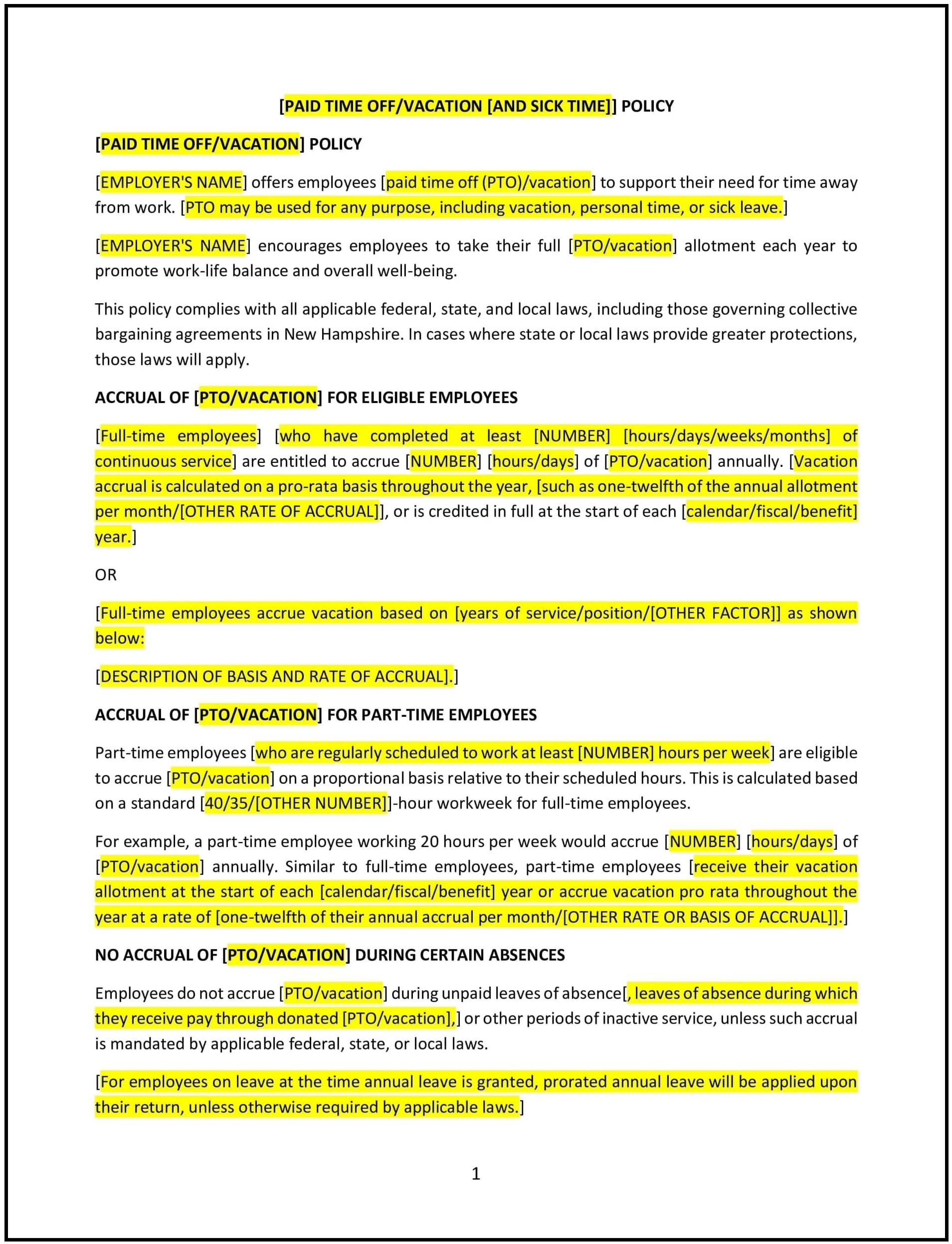Got contracts to review? While you're here for policies, let Cobrief make contract review effortless—start your free review now.

Customize this template for free
Vacation policy (New Hampshire)
A vacation policy helps New Hampshire businesses establish clear guidelines regarding paid time off (PTO), vacation days, and how employees can request and take time off. It sets expectations for eligibility, accrual, and the approval process while balancing employee needs and business operations.
By implementing this policy, businesses can ensure fairness in time-off requests, improve employee satisfaction, and maintain productivity during vacation periods.
How to use this vacation policy (New Hampshire)
- Define vacation accrual: Specify how vacation days are accrued, whether employees earn a set number of days per year, or if they accrue vacation over time (e.g., monthly, quarterly).
- Set eligibility criteria: Outline which employees are eligible for vacation days, such as full-time, part-time, or seasonal employees. You may also define waiting periods or probationary periods before employees can begin accruing vacation.
- Specify maximum or carryover limits: Establish whether employees can carry over unused vacation days from one year to the next, and if so, set limits on how many days can be carried over or the deadline by which vacation days must be used.
- Define vacation request process: Clearly outline how employees should request vacation, including the timeframes for submitting requests, any documentation needed, and how far in advance requests should be made.
- Address scheduling conflicts: Set expectations for handling situations when multiple employees request time off during busy periods, including how to prioritize or approve conflicting requests.
- Provide vacation pay details: Define how vacation pay will be calculated, including whether employees will be paid their regular rate or receive additional pay for unused vacation days.
- Establish rules for vacation during public holidays: Specify how public holidays affect vacation time (e.g., if a holiday falls during an employee’s vacation, whether it counts as a paid holiday or a vacation day).
- Set expectations for unused vacation: Clarify whether employees will be paid for unused vacation days at the time of termination or resignation, and any limitations on this payout.
- Review and update: Periodically review and update the vacation policy to ensure it aligns with changes in state laws, company needs, or best practices.
Benefits of using this vacation policy (New Hampshire)
This policy provides several benefits for New Hampshire businesses:
- Promotes employee well-being: Providing vacation time helps employees manage stress and maintain a healthy work-life balance, which can improve overall job satisfaction and productivity.
- Ensures fairness: A clear vacation policy ensures that all employees are treated equally when it comes to taking time off, reducing misunderstandings and conflicts.
- Improves retention: Businesses that offer generous vacation benefits are likely to attract and retain top talent, as employees value the opportunity to take time off and recharge.
- Boosts morale: Offering vacation time helps employees feel valued, supported, and trusted, which can boost morale and foster a positive company culture.
- Helps manage workloads: With a well-structured vacation policy, businesses can plan ahead for employee absences, minimizing the impact on day-to-day operations.
Tips for using this vacation policy (New Hampshire)
- Communicate the policy clearly: Ensure that all employees are aware of the vacation policy and understand the process for requesting time off and the conditions of eligibility.
- Plan ahead: Encourage employees to plan their vacation in advance to help ensure adequate staffing during peak periods.
- Be flexible: While balancing business needs, be flexible when approving vacation requests to support employees’ personal time off.
- Regularly review the policy: Periodically assess the policy to ensure it meets employee needs, industry standards, and any changes in state or federal regulations.
- Track vacation time: Keep accurate records of employees' vacation accrual and usage to avoid discrepancies and ensure compliance with the policy.